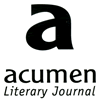Responses
Dear Acumen,
In his interesting ‘The Sound of Poetry’ (Acumen 49), Tim Love argues for two things: (1) that the sound of words is not arbitrarily related to their meanings (he swipes at de Saussure with this one) and (2) that, within a poem, sound may have ‘an alternative mode of meaning making sense an echo to the sound’. This second thesis is used to persuade us to have ‘more tolerance of poets like Dylan Thomas and Wallace Stevens’, in case we think they are sometimes ‘lapsing into non-sense’.
With regard to thesis (1). de Saussure argued that a language system is not a set of natural signs but a set of signs whose meaning relies on convention. In this, he was clearly right. He recognised the existence of onomatopoeia but thought that such effects were unusual in language, rather than mainstream. In this he was also right. Tim Love produces examples of words that apparently ‘sound like their meanings’, such as ‘little’ and ‘chop’, but discounts exceptions like ‘big’ and ‘small’. Slightly disingenuously he says ‘words derive from many sources and we should expect some exceptions’. The key point though is that the vast majority of words are exceptions to his thesis, and the reason for this is that a language system is not a set of natural signs.
That a language system is not, for the most part, a set of natural signs has enormous implications for poetry. Words neither look like nor sound like their meanings and the main problem facing the poet is to overcome this enormous obstacle to the writing of poetry. If words did sound like their meanings poetry might be a great deal easier to write well.
The second claim, that that there is a kind of ‘aural’ meaning in a poem that may ‘echo’ the sense of a poem is more plausible. The difficulty is to state this thesis correctly. What kind of meaning is conveyed by sound and what is the relation between sound and meaning in a poem?
There are clearly limits to the kind of meanings that sound can carry. Seamus Heaney, for instance, goes well beyond them when he claims in talking about the ‘Death by Water’ section in Eliot’s The Waste Land that ‘I began to construe from its undulant cadences and dissolvings and reinings-in a mimetic principle which matched or perhaps even overwhelmed any possible meaning that might be derived from the story of Phlebas’s fate ... an aural equivalent of the profit-and-loss people of the City of London’. Heaney here makes the mistake of reading the articulation of the meaning into the sound and maintaining that it comes from the sound only.
What sound generally seems to do in poetry is to ‘support’ meaning, rather than provide an alternative to it. Sound echoes sense rather than otherwise, as Tim Love would want to have it. But all talk of echoing here is misleading for it gives to either sense or sound a cognitive priority that, in understanding neither has, As de Saussure saw, sense and sound are actually codetermining. I do not recognise a word and then recognise its sound, or recognise a sound and then recognise that sound as a word. To recognise a word is both to recognise a sound and something that signifies, in one fell swoop.
Finally, I am not sure that Dylan Thomas and Wallace Stevens need our tolerance. Nor, to understand them, do we necessarily need to assume they are sometimes writing nonsense and to look in their work for an alternative, auditory mode of meaning. We need to see that that there is no alternative auditory mode of meaning, but that there may be ways in which poems have meaning that we have overlooked, ways that are an alternative to the linear, rationalistic notion of meaning that supports, in poetry anyway, the idea that some poems could be nonsense.
Robert Griffiths
Goldalming
Page(s) 125-127
magazine list
- Features

- zines

- 10th Muse
- 14
- Acumen
- Agenda
- Ambit
- Angel Exhaust
- ARTEMISpoetry

- Atlas
- Blithe Spirit
- Borderlines
- Brando's hat
- Brittle Star

- Candelabrum
- Cannon's Mouth, The
- Chroma
- Coffee House, The
- Dream Catcher
- Equinox
- Erbacce
- Fabric
- Fire
- Floating Bear, The
- French Literary Review, The
- Frogmore Papers, The
- Global Tapestry
- Grosseteste Review
- Homeless Diamonds
- Interpreter's House, The
- Iota
- Journal, The
- Lamport Court
- London Magazine, The
- Magma
- Matchbox
- Matter
- Modern Poetry in Translation
- Monkey Kettle
- Moodswing
- Neon Highway
- New Welsh Review
- North, The
- Oasis
- Obsessed with pipework
- Orbis
- Oxford Poetry
- Painted, spoken

- Paper, The
- Pen Pusher Magazine

- Poetry Cornwall
- Poetry London
- Poetry London (1951)
- Poetry Nation
- Poetry Review, The
- Poetry Salzburg Review
- Poetry Scotland
- Poetry Wales
- Private Tutor
- Purple Patch
- Quarto
- Rain Dog
- Reach Poetry
- Review, The
- Rialto, The
- Second Aeon
- Seventh Quarry, The
- Shearsman
- Smiths Knoll
- Smoke
- South
- Staple
- Strange Faeces
- Tabla Book of New Verse, The
- Thumbscrew
- Tolling Elves
- Ugly Tree, The
- Weyfarers
- Wolf, The

- Yellow Crane, The
